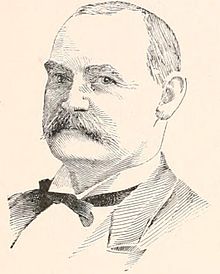James W. Hyatt
James W. Hyatt (born September 19, 1837 in Norwalk , Connecticut , † March 12, 1893 ibid) was an American banker, businessman and government official.
Career
James W. Hyatt, son of Laura Gray and James W. Hyatt, was born in Fairfield County at the start of the economic crisis of 1837 . Nothing is known about his youth. After the outbreak of the Civil War , he enlisted in the Connecticut 5th Infantry Regiment in 1861 . He moved to New York City after the end of the war , where he worked for Lockwood & Co., a leading banking house founded by LeGrand Lockwood from Norwalk. Hyatt acquired a majority stake in the Norwalk Horse Railway Company in 1873 . He returned to Norwalk and subsequently worked as its secretary and manager. At the time of his death he was president of the company. He was also vice president of the Danbury and Norwalk Railroad and became its president in 1881.
In 1875 and 1876 he represented Norwalk as a Democrat in the Connecticut House of Representatives . Hyatt used to belong to the Republican Party , but joined the Democrats in 1872. The governor of Connecticut Charles Roberts Ingersoll appointed him in 1876 to the Bank Commissioner. He was subsequently reappointed to office by the following governors: Richard D. Hubbard , Charles B. Andrews , Hobart B. Bigelow and Thomas M. Waller . In 1884 he was elected to the Connecticut Senate , but resigned from his seat to continue serving as a bank commissioner. President Grover Cleveland named him the United States Bank Examiner for Connecticut and Rhode Island in 1886 . In the spring of 1887, President Cleveland named him Treasurer of the United States . Hyatt held the post from May 24, 1887 to May 10, 1889. He was also from 1877 to 1878, then from 1880 to 1882 and finally from 1885 to 1887 Warden in the borough of Norwalk.
After suffering from gout and Bright's disease for several weeks , he died on March 12, 1893 in Norwalk. Though many believed Hyatt was rich, he nonetheless died a poor man and left nothing to his widow.
Individual evidence
- ^ Selleck, Charles Melbourne: Norwalk: v. 1 and supplement , Volume 1, The author, 1896, p. 342
- ↑ a b c James W. Hyatt obituary , The New York Times, March 12, 1893
- ^ He died a poor man , The New York Times, August 20, 1893
| personal data | |
|---|---|
| SURNAME | Hyatt, James W. |
| BRIEF DESCRIPTION | American banker, businessman, and government official |
| DATE OF BIRTH | September 19, 1837 |
| PLACE OF BIRTH | Norwalk , Connecticut |
| DATE OF DEATH | March 12, 1893 |
| Place of death | Norwalk , Connecticut |

